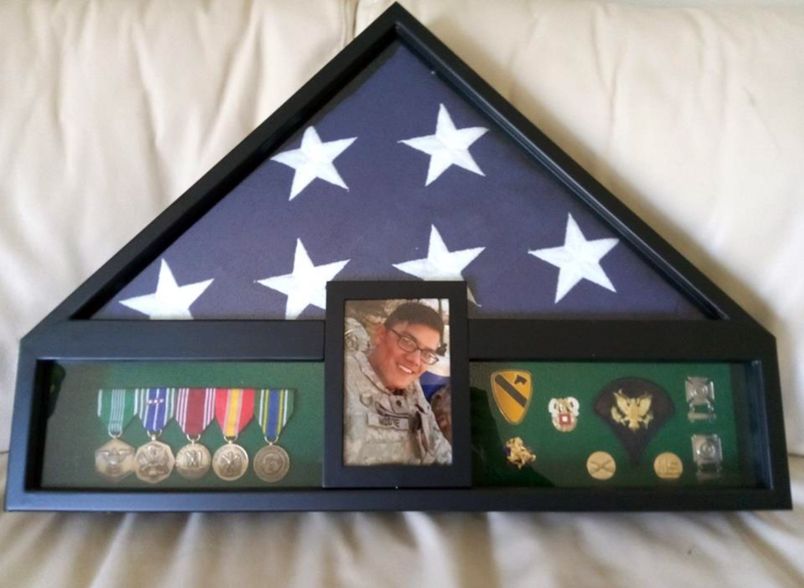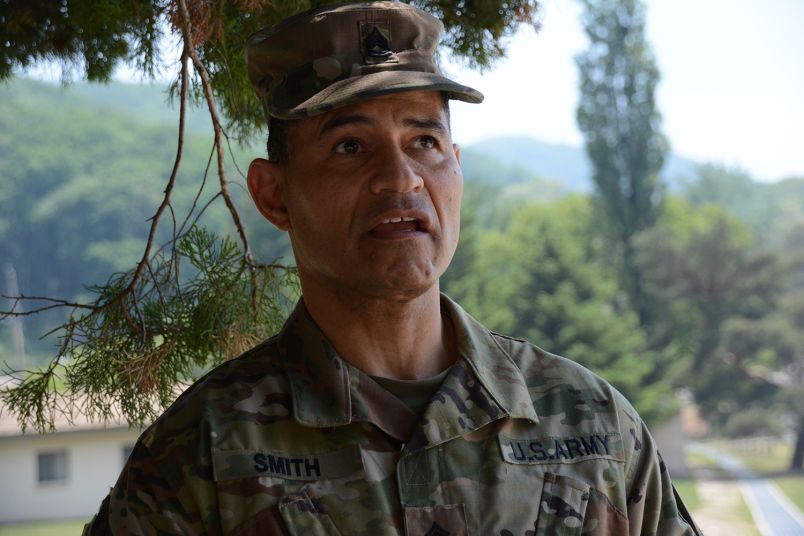Title:Soldier deaths in South Korea put spotlight on US military suicide crisis
Author:KIM GAMEL
Date:November 2019
Source:Stars and Stripes - Reprinted with Permission - ©2019 All rights reserved
Volume:Volume 3 Issue 160
CAMP HUMPHREYS, South Korea — Spc. Zachary Moore was drifting into and out of consciousness as the ambulance raced him to a South Korean hospital after he tried to kill himself.
"Call my mom, call my mom," the 23-year-old signal support systems specialist asked his friend, a fellow soldier.
Thousands of miles away in Florida, Jeanette Nazario answered the phone.
"I was notified by his battle buddies that he was in the hospital in critical condition, then they notified me when he was in stable condition," she recalled.
She became hopeful after a translator at the hospital said tests showed her son had not suffered any brain damage. But eventually his heart failed.
"I was gearing up to take care of my son the rest of his life. I was just in mommy mode. I was like, 'Let me just get him back,'" she said. "And that's when I got a knock on the door and they told me he had passed."
Moore died Aug. 2, 2017, hours after he was taken to St. Mary's Hospital in Uijeongbu from his barracks at Camp Hovey.
He was one of at least nine 2nd Infantry Division soldiers — ages 18 to 32 — who died by suicide in nearly three years, from May 2016 to April 2019.
Stars and Stripes obtained the manner of death of eight of those soldiers from the Army's Criminal Investigation Command.
A family attorney confirmed separately that Pvt. Courtney Shields killed herself on April 26 while she was home on leave. CID referred questions about her case to local authorities.
The number is not necessarily indicative of a trend, and suicide permeates all aspects of society. But it provides a grim snapshot of an unprecedented crisis in the military that has grown despite a concerted push and more than $1 billion to stop it.
"The number of suicides we've had is definitely concerning," said Capt. Joseph Dragonetti, the 2nd ID's psychiatrist. "Those are all lives lost and families that have had huge tragedies."
Deadlier than combat
David Rudd, a former military psychologist and suicide expert, said the armed forces need to develop a better understanding of the effectiveness of suicide prevention efforts, and to come up with a more strategic and coordinated approach.
"We've been at war for almost 18 years now," said Rudd, president of the University of Memphis. "That means we've been in a sustained, high operational tempo for almost two decades in the military, and that's difficult to manage."
He stressed the need for thorough mental health screening in recruiting efforts and subsequently offering treatment as soon as problems are identified.
"They have laxed a little bit on previous mental health issues in the military and that certainly, I think, elevated some of the risk and some of the concerns," he said.
The Pentagon reported that 541 service members died by suicide last year, up from 511 in 2017 and 482 in 2016, according to a report released in September.
Suicide rates for active-duty troops, which specialists say more accurately reflect trends, increased from 18.5 to 24.8 per 100,000 service members from 2013 to 2018.
Service members who die by suicide are mostly male, white and under the age of 30, said Karin Orvis, director of the Defense Suicide Prevention Office.
The New York Times reported this month that suicide has been deadlier than combat for the military, citing congressional testimony from Rand Corp. researcher Terri Tanielian that more than 45,000 veterans or service members have killed themselves in the past six years.
"That is more than 20 deaths a day — in other words more suicides each year than the total American military deaths in Afghanistan and Iraq," the Times reported.

Soldier's struggle
Moore was stationed with the 9th Cavalry Regiment, 2nd Armored Brigade Combat Team, 1st Cavalry Division, in South Korea, where the military isn't fighting but is constantly on alert and in training mode due to the threat from North Korea.
When asked specific questions, the division, based in Fort Hood, Texas, said it could not address the circumstances of Moore's death due to privacy concerns.
"The Army is a family that does its best to prepare soldiers for challenging situations in combat, and also in daily life," division spokesman Lt. Col. Chris Brautigam said. "Suicide is a challenge our 1st Cavalry Division and Army family continues to battle, but the Army has several mechanisms designed to assist soldiers who need help."
Those include periodic health assessments and pre-deployment readiness processing that includes meetings with health care providers who can help soldiers address their medical and mental health needs.
The unit also has counselors and chaplains to provide discreet mental health counsel.
"Most importantly, unit leaders and soldier battle buddies spend countless hours together and serve as a support mechanism for those who need assistance," he said.
Nazario, a 47-year-old catering server from Clermont, Fla., believes her son's death could have been prevented.
He should not have been deployed because he was being treated for depression, she said in a video interview.
She said she had to file a Freedom of Information Act request to obtain her son's death certificate and other information about the investigation.
Moore had expressed concern about his condition but was assured by his superiors he would have access to behavioral health care in South Korea and was given a mental health waiver permitting him to go despite his reservations, she said.
His unit began its nine-month rotation in South Korea in June 2017, less than a year after Moore had suffered a mental breakdown and briefly went AWOL while at Fort Hood.
Nazario said her son began receiving treatment after the Fort Hood incident and was still on anti-depression medication when he left for South Korea.
"They put him in the most high-stress position knowing that he had behavioral health issues," she said, "so not only was he burned out but stressed out."
Nazario said her son had changed his mind about suicide after consuming an entire bottle of his anti-depression medication on Aug. 1, 2017, but he didn't get the care he needed to survive.
"He sent out red flags to everyone," Nazario said. "He let them know exactly what he took."
Problems included a lack of urgency when he notified the duty desk in his barracks that he had consumed the pills and a language barrier with the South Korean ambulance crew, she said, citing witnesses.
"It took almost 30 minutes to convince them to take my son in the ambulance because they didn't know why they were taking him," she said, adding that he began losing consciousness in the ambulance.
Nazario, who met with military officials to discuss her son's case last year, believes the cause of death for her son should be changed to accidental suicide.
"I acknowledge he did take the bottle. He did. But he also tried to live, and that is so important — that my son tried to live," she said.
Warning signs
Nazario has been vocal in her criticism of the military's handling of her son's case in large part because she wants to see reforms aimed at preventing others from following suit.
"We need a cultural change," she said. "Behavioral health care is not really monitored. It's a one-size-fits-all mentality and that can even go further in my son's case. They deployed him because they needed to have a body count to be deployed ... but he ended up coming back in a body bag."
Experts stress that suicide can be prevented and urge people to watch for warning signs that include previous attempts, talk about dying, withdrawal from social interactions and feelings of hopelessness.
Top risk factors include access to firearms, relationship problems and administrative or legal problems. Recommendations for helping somebody who may be suicidal include being direct, nonjudgmental, and willing to listen, and seek help, according to the Defense Suicide Prevention Office.
The soldiers who died while serving with the 2nd ID in South Korea were from different units and backgrounds.
Shields was the youngest, at 18. She was a signal support systems specialist from Bryans Road, Md., who initially thrived after arriving in South Korea to work with the Special Troops Battalion, 2nd ID Sustainment Brigade.
"She was a valued member of the Dragon team that could brighten up any room with her infectious smile," battalion commander Lt. Col. Jeremiah Pope, said at the time of her death.
But Shields appears to have suffered some trauma during her field work, according to Tamara Miller, a lawyer and retired Air Force officer who is representing the family.
"That's when Courtney's mental state really appeared to decline precipitously," Miller said, adding she's satisfied with the military's investigation so far but hopes it will be expanded. "We're trying to urge the Army to look into the possibility of a sexual assault having occurred."
Shields also told her mother that she had sought medical care for her depression, but her job requirements interfered with her ability to keep appointments, Miller said.
Pfc. Adrienne Barillas, 22, was a water purification specialist from Texas who grew up in the Central American nation of Belize. South Korea was her first assignment in the Army.
Barillas, who died on Sept. 23, 2018, at Camp Humphreys, was remembered at a memorial service for her warm smile and cooking skills.
Sgt. Adam David Wright, 32, a multiple launch rocket system gunner from Beebe, Ark., died Nov. 11, 2018, at Camp Casey. Wright had been an officer in the National Guard but resigned his commission to become an active-duty soldier because he wanted to serve America in a foreign country.
Pfc. Travis Walklin, 21, of Silver Springs, Nev., died May 3, 2016, at Camp Carroll after he was found unresponsive outside a barracks building. He was assigned to the Sustainment Brigade.
Sgt. Jacqueline M. Anderson, 26, who died July 31, 2016, at her off-base apartment in Dongducheon. Anderson, of Leesville, La., shared the apartment with her husband, Sgt. Carl Anderson. They were assigned to the 210th Field Artillery Brigade.
Sgt. Kenneth W. Morris, 32, who died Nov. 13, 2016, at Camp Hovey. He had enlisted in the Army at 18 as a food- service specialist and had served in Iraq, according to his obituary.
"SGT Morris was known as the funny guy that everyone could count on to give them a hand or a laugh," it said, adding that the only thing he loved more than working on his car was "caring for his three children."
Sgt. Marcos John S. Aguon, 28, a 1st Armored Division soldier who joined the Army in his hometown of Talofofo, Guam, died Nov. 4, 2018, at Camp Hovey. He was a cannon crew member with the Fort Bliss, Texas-based 3rd Armored Brigade Combat Team, which had rotated to South Korea the previous month.
Raising awareness
The military has taken steps to improve awareness about suicide prevention and to remove the perceived stigma that seeking help may adversely affect chances for promotion or security clearances. Chaplains and leaders at all levels have increased outreach.
"The foundation of prevention is soldier-to-soldier and leader-soldier engagement," 2nd Infantry Division spokesman Lt. Col. Martyn Crighton said, adding that the personal interaction reduces isolation and increases the chances for early intervention if needed.
This past summer, the 2nd ID opened the new Warrior Behavioral Health clinic in Building 7315 in the center of the motor pool on Camp Humphreys to improve accessibility. It's also solely focused on care for active-duty soldiers, which provides important mission understanding and scheduling flexibility.
Previously, troops had to go to facilities across the base or to Seoul. There's a similar facility at Camp Casey, where the 210th Field Artillery Brigade and other soldiers are based near the border with North Korea.
Dragonetti, the 2nd ID psychiatrist, said soldiers face the same major risk factors as the general population but have additional challenges.
"One of the big ones would be that we're on the other side of the world from most people we know," he said during an August interview at Camp Humphreys.
"The stigma for behavioral health is decreasing, and we're really actively trying to break down those barriers. We're trying to make ourselves less scary."
Pervasive problem
The problem is not unique to the military. Suicide rates in the United States have been on the rise, with the Centers for Disease Control and Prevention reporting a 33% increase from 1999 to 2017.
Officials say the suicide rate among most military populations, when adjusted for age and gender, is comparable to civilian rates.
"I wish I could tell you we have an answer to prevent further, future suicides in the Armed Services. We don't," Defense Secretary Mark Esper told reporters in September.
"I believe we have the means and the resources to get ahead of this and do better than our civilian counterparts," he said. "We just can't let these great, young Americans take their lives because of financial pressure or relationship challenges, or whatever comes up. We need to help them."
Elspeth Cameron Ritchie, a retired colonel who served as a psychiatrist for the 2nd ID in South Korea in 1990 and was later the Army's top psychiatrist, agrees.
"It has been a problem for a long time, and they have tried everything," said Ritchie, who participated in several task forces on the subject before retiring from the military in 2010.
"It's not higher in the military, but it should be lower," she said of the suicide rate. "The reason for that is that everybody in the military is employed; they have health care; they have jobs; they often have a mission and a sense of purpose."
Ritchie, chair of psychiatry at Medstar Washington Hospital Center, noted the problem is complicated by relatively easy access to firearms and a military culture that values toughness.
"Leaders certainly get a lot of training on not singling out people and suicide prevention, but how that translates in the hyper-masculine world among the troops in the field does vary from unit to unit," she said.

Successful intervention
That training paid off in a recent case involving a young 2nd ID soldier who was on his first overseas assignment for the Army.
Pfc. Austin Farrell, 22, was struggling with his supervisors last year, and his personal life was shattered when his fiancee broke up with him long distance.
Feeling lonely and isolated, the Titusville, Fla., native started having suicidal thoughts.
Sgt. 1st Class William Smith listened to other noncommissioned officers discussing Farrell's case after concern was raised. Smith, who spent his childhood in and out of foster homes, decided he could help.
"I was told the soldier was really depressed and thinking of doing some harm to himself," Smith, 52, told Stars and Stripes. "Basically, I just stepped up and said, 'Let me work with him.' "
The Tallahassee, Fla., native had Farrell moved into his section at the headquarters battalion and began escorting the soldier to the behavioral health unit at the former military hospital in Seoul.
He also developed a friendship with Farrell by talking about things they had in common.
"By doing that he was able to share a side of his life with me," Smith said. "He started opening up a little bit. His attitude started changing."
Farrell said he had been frustrated by supervisors in his previous unit and felt increasingly isolated from his family.
"The leadership started talking down to soldiers," he said. "A lot of it was that I felt like I was useless, and I felt alone. I thought I would be alone for the rest of my life."
Farrell credited Smith with helping to turn the situation around, saying he had been on the brink of being discharged from the Army before overcoming his behavioral health concerns.
"He had a lot of hard choices in his life too," Farrell said. "He showed me that it's not always a dark side ... you always have to look towards the brighter part."
Smith's advice to others trying to help a service member?
"First help the soldier, get the soldier back to normal," he said. "Then he can be an asset, and that just makes us a better section."
If you or someone you know may be considering suicide, contact the National Suicide Prevention Lifeline at 1-800-273-8255 (1-800-273-TALK) in the United States. Press 1 for the veterans and military crisis lines. You can also text 838255.
In South Korea, you can reach that number by calling 050-3337-4673, press 1, or DSN 118. The 2nd Infantry Division also provides a list of advice and resources. DSN 911 is the general on-post emergency number. You can call 119 for emergencies elsewhere in South Korea. For more information, visit the Veterans' Crisis Line.
In Europe, you can call 00800 1273 8255 or DSN 118. In Afghanistan, you can call 00 1 800 273 8255 or DSN 111.


